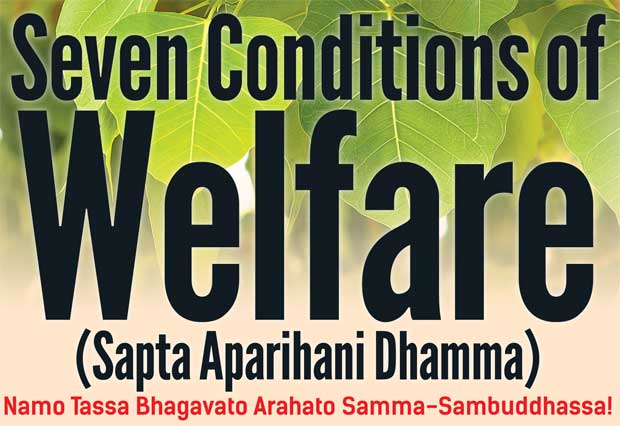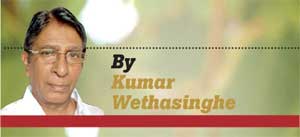Reply To:
Name - Reply Comment
Last Updated : 2024-04-19 00:03:00

 uring his indefatigable long, long last journey from Rajagaha to Kusinara, with great compassion he conducted comprehensive religious discussions
uring his indefatigable long, long last journey from Rajagaha to Kusinara, with great compassion he conducted comprehensive religious discussions
of inexpressible value to both lay and Bhikkhu community.
Such significant and edifying discourses included “Conditions of welfare” the “Nature of upright conduct”, “Mirror of the Truth” and “Five-fold loss and gain for householders” etc.
While the Buddha was staying at the Vultures’ Park in the City of Rajagaha, Vassakara the Chief Minister to King Ajatasatta, visited the Buddha to seek his advice as to how the King Ajatasatta could conquer the Vajjans.
“Oh Brahmin! During my stay at Sarananda Vihara at Vesali, I have taught the Vajjans, “the seven conditions of welfare”, and so long as those conditions shall continue to exist among the Vajjans, so long as the Vajjans shall be well instructed in those conditions, so long may we expect them not to decline, but prosper”.
Having listened to the Buddha, Vassaka expressed, “we may expect then Lord!, that Vajjans cannot  be overcome by the King of Magadha, in battle without diplomacy or breaking up so long they observed thee seven conditions of welfare”. The Buddha ended up saying, ‘Brahmin whatever you think most fitting’.
be overcome by the King of Magadha, in battle without diplomacy or breaking up so long they observed thee seven conditions of welfare”. The Buddha ended up saying, ‘Brahmin whatever you think most fitting’.
(1) as long as the Vajjians meet frequently and hold many meetings; (2) as long as they meet together in unity, rise in unity and perform their duties in unity; (3) as long as they enact nothing not enacted, abrogate nothing that has already been enacted, act in accordance with the already established ancient Vajjian principles; (4) as long as they support, respect, venerate and honour the Vajjian elders, and pay regard to their worthy speech; (5) as long as no women or girls of their families are detained by force or abduction; (6) as long as they support, respect, venerate, honour those objects of worship – internal and external – and do not neglect those righteous ceremonies held before; (7) as long as the rightful protection, defence and support for the Arahants shall be provided by the Vajjians so that Arahants who have not come may enter the realm and those who have entered the realm may live in peace – so long may the Vajjians be expected not to decline, but to prosper.
Thereafter the Buddha instructed Ven. Ananda to call up an assembly of bikkhus at the Service Hall. When it was so arranged, the Blessed One made his appearance at the assembly.
Oh Bikkhus! I will teach you the seven conditions of the welfare of the community.
(1)”As long as the Bhikkhus assemble frequently and hold frequent meetings, (2) as long as the Bhikkhus meet together in concord, rise in concord, and perform the duties of the order in concord; (3) as long as the Bhikkhus shall promulgate nothing that has not been promulgated, abrogate not what has been promulgated, and act in accordance with the already prescribed rules; (4) as long as the Bhikkhus support, respect, venerate and honour those long-ordained Theras of experience, the fathers and leaders of the Order, and respect their worthy speech; (5) as long as the Bhikkhus fall not under the influence of uprisen attachment (craving), that leads to repeated births; (6) as long as the Bhikkhus shall delight in forest retreats in life of solitude; (7) as long as the Bhikkhus develop mindfulness within themselves so that disciplined co-celibates who have not come yet may do so and those who are already present may live in peace – so long may the Bhikkhus be expected no to decline, but to prosper. As long as these seven conditions of welfare shall continue to exist amongst the Bhikkhus, as long as the Bhikkhus are well-instructed in these conditions – so long may they be expected not to decline, but to prosper.
With boundless compassion the Buddha further enlightened the Bhikkhus on seven other conditions of welfare as follows:
“As long as the Bhikkhus shall not be fond of, or delight in, or engage in, business; as long as the Bhikkhus shall not be fond of, or delight in, or engage in, gossiping and idle talk; as long as the Bhikkhus shall not be fond of, or delight in, sleeping; as long as the Bhikkhus shall not be fond of, or delight in, or indulge in, society; as long as the Bhikkhus shall neither have, nor fall under, the influence of sinful desires; as long as the Bhikkhus shall not have evil friends or associates and shall not be prone to evil – so long the Bhikkhus shall not stop on their way to Nirvana or at mere lesser, special acquisition without attaining Arahantship.
Furthermore, the Buddha added that as long as the Bhikkhus shall be devout, modest, conscientious, full of learning, persistently energetic, constantly mindful and full of wisdom – so long may the Bhikkhus be expected not to decline, but to prosper.
Enlightening the Bhikkhus with several other discourses, the Buddha, accompanied by Venerable Ananda, left Rajagaha and went to Ambalatthika and thence to Nalanda, where He stayed at the Pavarika mango grove. On this occasion the Venerable Sariputta approached the Buddha and extolled the wisdom of the Buddha, saying: “Lord, so pleased am I with the Exalted One that methinks there never was, nor will there be, nor is there now, any other ascetic or Brahman who is greater and wiser than the Buddha as regards Self Enlightenment.”
The Buddha, who did not approve of such an encomium from a disciple of His, reminded Venerable Sariputta that he had burst into such a song of ecstasy without fully appreciating the merits of the Buddhas of the past and of the future.
Venerable Sariputta acknowledged that he had no intimate knowledge of all the supremely Enlightened Ones, but maintained that he was acquainted with the Dhamma lineage, the process through which all attain supreme Buddhahood, that is by overcoming the five Hindrances – namely, (i) sense-desires, (ii) ill-will, (iii) sloth and torpor, (iv) restlessness and brooding, (v) indecision; by weakening the strong passions of the heart through wisdom; by thoroughly establishing the mind in the four kinds of Mindfulness; and by rightly developing the seven factors of Enlightenment.
At the time Sunida & Vassakara Chief Ministers of King Ajatasatta were hurriedly building a fortress at Pataligama. That night the Buddha, perceiving with his Super Normal Vision surpassing that of ordinary folk, noticed the presence of thousands of divine beings at the fortress site and predicted next day that the Pataliputta, would soon become the Main City, but would be with danger from fire, water & dissension.
Meanwhile before his significant final departure the Buddha accepted the Chief Ministers Vassakara’s invitation for meals. In honour of Buddha’s visit they named the gate by which he left the city as, “Gotamagate”. Next in programme was to go to Kotigama across the ‘Ganges’, but it was brimfully flooded. As the Buddha stretch forth his arms too and fro and vanished from this side to the opposite side of the river bank making all those present surprise. This was a rare instance where the Buddha exercised his psychic power. The Blessed One beheld all those who were looking for boats and ferries to go across the river. At the moment they sang
“They who cross the ocean drear
making a solid path across the pools
whilst the vain world ties its basket rafts.
These are the wise, these are the saved in deed”, ever since the place became named as the ‘Gotama Ferry’.
From Kotigama he proceeded village Nadika, and stayed at the Brick Hall. There Ven Ananda approached him and respectfully questioned him about the future of certain persons who had died in that village.
The Buddha patiently explained details of some of the deceased and advised Ven Ananda how to acquire the ‘Mirror of the Truth’, so that an Arya disciple endowed there with may predict of himself thus. Destroyed for me in birth in woeful state, Animal realm, Peta realm, sorrowful evil and low states. A stream winner am I, not subject to full assured of final Enlightenment. O’ Ananda, is the Mirror of the Dhamma.
From Nadika, The Buddha went to the glamorous city of Vesali and stayed at the mango groove of Ambapali the beautiful courtesan.
Anticipating her visit, the Buddha in order to safeguard his disciples adviced them to be mindful and reflective then he taught them the way of mindfulness. Ambapali hearing of the Buddha’s arrival at her mango groove, visited the Buddha and the Maha Sangha to pay her obeisance.
Ambapali came first and pleaded the Buddha and his disciples to take meals at her place and the Blessed One gave his consent by silence. Lichchavi Royals too rushed to worship the Buddha, with an invitation for meals at their palace next day but Buddha informed them that already he had accepted Ambapali’s invitation, for that day. Having offered the meals to the Buddha and Maha Sangha, Ambapali gladdened by the religions discourse readily gifted her beautiful mansion to the Maha Sangha.
It was at the mango grove the Buddha preached the ‘Nature of up right conduct’ and ‘great is the fruit, great the advantage of earnest contemplation when set round with up right conduct. Great is the fruit, great the advantage of intellect when set round with earnest contemplation. The mind set round with intelligence freed from the great evils,
That is to say, from sensuality from individuality from delusion and
from ignorance.
Perera Saturday, 13 June 2020 09:35 AM
Sadu,Sadu,Sadu
kirama dhammananda Sunday, 17 December 2023 02:00 AM
perfect

Add comment
Comments will be edited (grammar, spelling and slang) and authorized at the discretion of Daily Mirror online. The website also has the right not to publish selected comments.
Reply To:
Name - Reply Comment
On March 26, a couple arriving from Thailand was arrested with 88 live animal
According to villagers from Naula-Moragolla out of 105 families 80 can afford
Is the situation in Sri Lanka so grim that locals harbour hope that they coul
A recent post on social media revealed that three purple-faced langurs near t